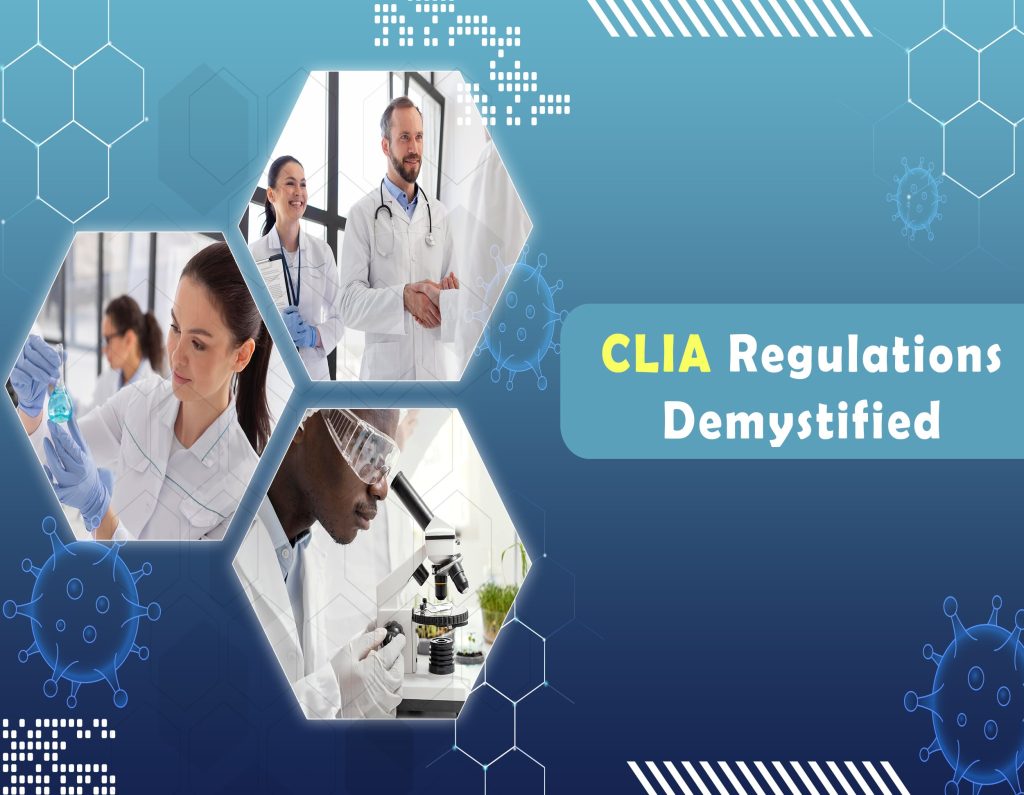In the realm of healthcare, laboratories play a pivotal role in diagnosing and monitoring diseases, ensuring patient safety, and advancing medical research. The accuracy and reliability of laboratory test results are paramount, and this is where the Clinical Laboratory Improvement Amendments (CLIA) regulations come into play. Understanding and ensuring compliance with CLIA regulations is essential for laboratories to operate effectively and provide accurate test results. In this blog post, we will demystify CLIA regulations, explaining their significance and providing insights on how to maintain compliance in your lab.
What are CLIA Regulations?
The Clinical Laboratory Improvement Amendments (CLIA) were enacted in 1988 and are administered by the Centers for Medicare & Medicaid Services (CMS). CLIA regulations establish quality standards for laboratory testing to ensure that the results are accurate, reliable, and consistent. Compliance with CLIA regulations is mandatory for any facility that performs testing on human specimens for health assessment, diagnosis, prevention, or treatment. The regulations cover a wide spectrum of laboratories, from small physician office labs to high-complexity clinical labs.
Types of Laboratories Under CLIA
CLIA regulations categorize laboratories based on the complexity of testing they perform:
Waived Testing Laboratories: These labs perform simple, low-risk tests with a minimal chance of error. They have the least regulatory burden.
Moderate Complexity Laboratories: These labs conduct tests that require a moderate level of expertise and may have a greater potential for error. They have more stringent regulatory requirements than waived labs.
High Complexity Laboratories: Labs performing complex and specialized testing fall into this category. They face the highest level of regulatory scrutiny and have the most stringent requirements.
CLIA Waiver: What Does It Mean?
Labs performing waived tests can obtain a CLIA waiver, which allows them to perform specific tests with minimal regulatory oversight. Obtaining a CLIA waiver is not an exemption from quality standards but rather a recognition that these tests are straightforward and have low risk when conducted correctly.
Personnel Requirements
Under CLIA regulations, lab personnel must meet specific education and experience requirements based on their roles. This ensures that the individuals handling the testing processes are competent and capable of producing accurate results. Additionally, labs must establish and document training programs for their staff to maintain compliance.
Quality Control and Proficiency Testing
Quality control (QC) and proficiency testing are integral parts of CLIA compliance. Labs must implement comprehensive QC programs to monitor the accuracy and precision of their tests. Proficiency testing involves evaluating the lab’s performance by comparing its results to known standards, helping ensure the accuracy of patient results.
Compliance Challenges and Solutions
Maintaining CLIA compliance can be challenging, especially in high-complexity laboratories. Some common hurdles include staff turnover, evolving regulations, and managing documentation. To overcome these challenges, labs should invest in ongoing staff training, stay informed about regulatory updates, and utilize modern Laboratory Information Management Systems (LIMS) to streamline record-keeping.
Upcoming Changes in CLIA
Like all regulations, CLIA is subject to updates and changes. Staying informed about these changes and adapting your lab’s procedures accordingly is essential to ensure compliance.
Conclusion
In the world of laboratory testing, CLIA regulations are the cornerstone of quality and reliability. Compliance with CLIA ensures that patients receive accurate and trustworthy test results, which are critical for proper diagnosis and treatment. Understanding the different aspects of CLIA regulations, from laboratory categorization to personnel requirements, is the first step in ensuring compliance.
By demystifying CLIA regulations, labs can provide better patient care, contribute to medical research, and maintain their reputation for excellence in the healthcare community. Staying up-to-date with the latest developments and being proactive in implementing quality control measures will help your lab meet and exceed CLIA standards, ultimately benefiting both your patients and your institution.
For further guidance and to stay informed about the latest in lab compliance, consider attending relevant training courses and workshops, as well as engaging with professional networks in the field.
Compliance is not just about following the rules; it’s about ensuring the well-being of those who rely on the results your lab produces. Embrace the challenge, and you’ll find that CLIA compliance becomes a cornerstone of your laboratory’s success.
If you have any questions or need further assistance with CLIA compliance, please feel free to contact us at IQ Lab Consultants.


